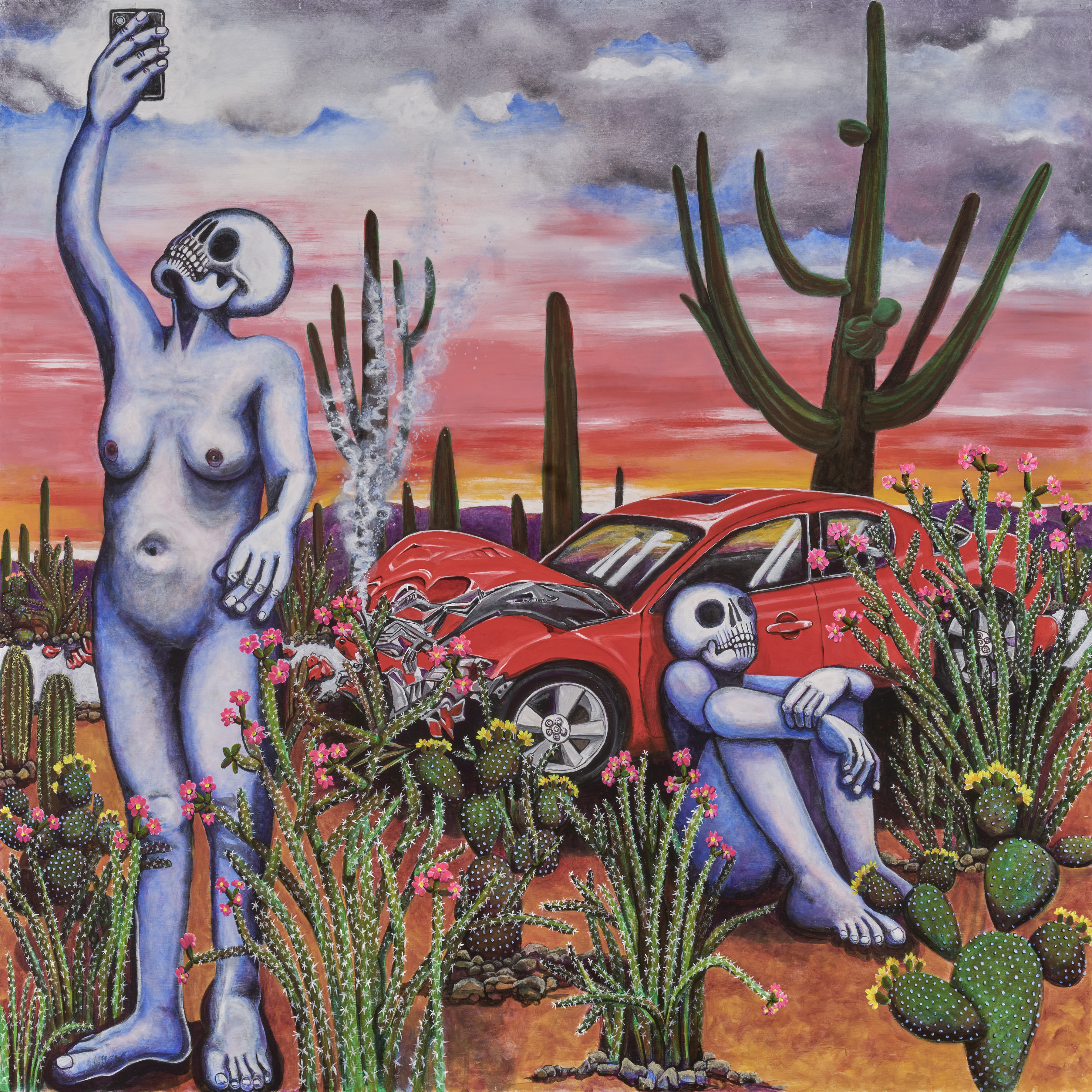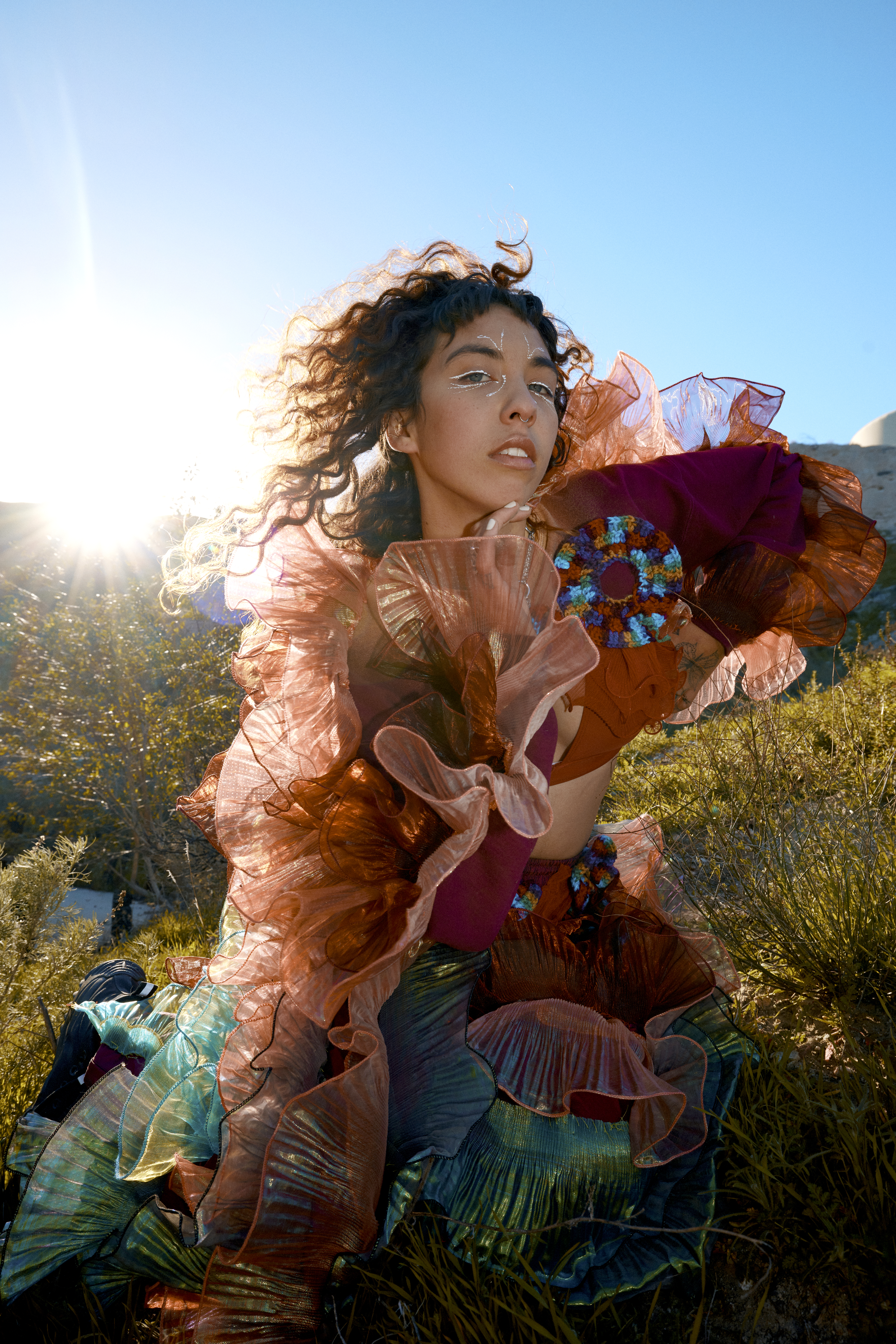Spring cleaning. A rummage through the backs of closets, between crevices, and into the corners of junk drawers: discovering forgotten or hidden items meant for a different day. The paper-thin t-shirt adorned with tea stains, or toy figurines with chipped paint and a broken limb, or even a letter, once glossy with ink—now dusted and stiff. This act of leaning into nostalgia, taking stock of the past and placing the no-longer needed items in a cardboard box, becomes a freeing act, a way to move forward. It is in these bundled recollections of childhood, love, and community that Indigo De Souza situates her latest record, All of This Will End.
Atop vocal distortion and a dreamy piano, she opens with a revelation: “I feel like I’m leaving myself behind.” Similar to her 2018 debut I Love My Mom and her breakout second album Any Shape You Take from 2021, her third album also forays into the thematic world of self-transformation—this time though, manifesting as a reclamation of one’s life. “I wanna get back up again,” she sings a few lines later. As if shedding a snakeskin, Indigo de Souza slips through these memories, coming out on the other side with a new perspective: acceptance of a transient existence.
When I sit down with De Souza, she relates this idea to the album title: the “double meaning depending on who you are. You could see it as something dark and sad, that ‘all of this will end,’ or you could feel hopeful because it means you really get to appreciate the preciousness of being alive now,” she says. Over the last nine years, De Souza has documented these complex ruminations on joy and pain within her music; with her new album, she details a change: “I have gone from the more depressive side to the more positive side in my evolution as a human…I wanted to create an ode to that shift.” When I ask her how she would describe the album, she pauses before saying, “wild and triumphant and realized and fearless.” With just four words, De Souza seems to encompass the soaring, yet solitary experience of All of This Will End.
Take the second track, “You Can Be Mean,” a 2000s-inspired snappy pop-punk cut detailing a toxic experience with a “manipulative and abusive LA model fuckboy.” She calls back to the high-flying standout “Good Heart” from her debut, though now she sings, “I’d like to think you got a good heart and your dad was just an asshole growing up / But I don’t see you trying that hard to be better than he is.” Wittily recognizing her past, she ultimately comes around, recognizing the maturity in accepting what one cannot control.
De Souza presents such ideas candidly on the title track: “I don’t have answers—no one does / I’ve been finding comfort in that.” It is the bluntness of these concessions that makes De Souza’s music so relatable. On the melancholic “Losing,” De Souza begins, “Am I losing to the dark? / Is it overtaking me?,” and later asks, “Am I trying hard enough? / Or am I trying too much?” She concedes, “There’s nothing I can do when the winds of change blow through.” The song closes with a wry chuckle, as if laughing at the insolvable queries she laid out in the previous two minutes.
While the record embodies these forms of freedom and overcoming, De Souza’s journey to this mindset was not easy. For one, upon the completion of her last album, she lost her band, forcing her to quickly reassemble in preparation for an upcoming record and an extensive tour. “In a way, I did tons of touring—too much touring—which caused me to become burnt out and unhealthy…I think the worst part about being burnt out last year was that I didn’t always have the energy to give to the audience the way I wanted to, and I ended up having to cancel a tour.”
The album’s climax, “Always,” sees De Souza therapeutically excavating her relationship with her father. As she lulls listeners with a soft guitar strum, the song bursts halfway through into a glass-shattering firework of guitars, drums, and guttural screams, calling back to the hallowing “Real Pain.”
Even with such struggles, though, De Souza has always emphasized using her platform to aid others. On her tour last spring, she partnered with Road to Recovery, an outreach program supporting community-based mental health resources. She says, “It feels really important because the mental health system is really fucked up and it’s hard to find help…I’ve experienced that firsthand and continue to experience that, honestly. I’m in this mindset now where there are so many people that need support and if the systems are failing them, we have to bond together as a community to find support…That feels kind of like the only way to heal. I’m still dialing in how to do that and what it means and what actually is helpful…but for now, I’m trying to be a steady force of positivity and support for people.”
For De Souza, this focus on human connection and community has been vital in reaching a lighter place in her creative process. “When I’m on tour, I’m so busy I barely have a moment to collect myself…When I get back [home] and I’m in the safety of my own home and community, I think that songs come a lot more easily.”
One of her main forms of support is her mother, Kim Oberhammer, whose creative fervor has interlocked with De Souza’s over the years. Since the apt-titled I Love My Mom, Oberhammer has painted her daughter’s three album covers—distinctly stylized scenes of skeletal figures enclosed in foliage-filled environments. Beyond just stunning works of art, they embody each album’s central themes, tracing De Souza’s natural growth in their beautifully haunting depictions of childhood to adulthood. In the cover for All of This Will End, a saguaro-splashed scene wraps around a totaled car and two of Oberhammer’s hallmark figures—this time both grown and representing reflection, growing pains, and a desire for connection.

“My mom has always made whatever she wants to make and worn whatever costume she wants to wear wherever she wants and she’s never had any shame around expression…to an extreme.” She laughs, recalling varying moments from her childhood. “When I was young, I was pretty embarrassed by her and so confused why she wanted to express herself so much in a town where other people weren’t doing that at all, but it taught me a lot about not caring what other people think and having the confidence to try doing the things you want to do yourself instead of asking for help.”
Along with music, such a sentiment has manifested itself in the creation of the album’s accompanying visuals. Assuming various roles—from director, videographer, editor, and costume designer—De Souza’s vision remains crystalline. “Somebody was trying to get me to have a New York designer design the costumes and it was going to be really expensive. I thought, ‘We don’t need to do that, I’ll just ask my mom for help and we’ll just make the costumes ourselves.’ It feels really good to get things done yourself because it feels productive and it’s fun, but you also have a deeper connection to the artwork you’re making if you poured so much energy into it.”
Such is the case for the universally praised first single, “Younger & Dumber,” a cathartic ballad whose accompanying video embodies its explosive, yet reclusive style. At the song’s onset, she oozes with a tingling ache: “When I was younger / Younger and dumber / Built like a flower.” In the video, De Souza dances around a debris-littered set in a wavy costume and an alienesque mask, interjecting home videos of childhood vignettes. Like the flicker of a View-Master, the video pieces these images of the past with her present freedom to create a moving ode to reminiscence. As the song apexes, the video sees rain pouring on De Souza as she unleashes her body. The stinging conclusion—“When I was younger / Younger and dumber / I didn’t know better”—emphasizes De Souza’s journey, closing the album with a ray of nostalgia and hope.
Though she underlines that the process of creating productions such as “Younger & Dumber,” or the video for the joyous second single, “Smog”, can be “discouraging” due to extremely high expenses, she commends the team with whom she collaborated. “I would love to do it more and the team that I worked with on these two music videos are just the best people.” Particularly, she turns to her experience filming “Younger & Dumber” on psilocybin, stating, “They treated me with so much care and they were so respectful of me and my space and so gentle with all their directions.”
She credits psychedelics with the ability to feel more connected to the surrounding physical and natural world. She recalls “the number of times [she’s] taken mushrooms and laid in the grass and completely disappeared and genuinely felt that we are the same as everything around us.” This mentality grounds her work in an organic energy and seeps into the middle and latter sections of the album. On the penultimate track, “Not My Body,” an alt-rock number with some of the album’s most glistening vocals, De Souza sings, “I want to be a redwood tree,” blurring the space between herself and nature.
“I kind of live with the awareness that I am nature, that I am everything around me. I feel a deep oneness with all organisms and plants, and part of me is very excited for the day that I am done with my life and I get to just become an actual, physical part of everything,” she adds. These ideas of decomposition and fading into nature also appear on the bouncy standout, “Parking Lot,” where she sings, “When the day is done, I feel like I could turn to dust.” There’s a tinge of melancholy, sure, but like the album’s thesis, De Souza underscores the beauty of impermanence.
Though she spends the majority of the album’s thirty-three-minute runtime accepting temporality, the music forms a body of its own. Through a practice of recollection and remembrance, she packages these hidden, deep memories and lays them on the side of the road in search for a new home. In the album’s statement, De Souza says, “[F]or now, I can do so much with being alive.” While she is here, De Souza once again lays her whole body out in her music, creating another work that will inarguably carry on with a life of its own.
All of This Will End is out April 28 via Saddle Creek. More information regarding Indigo De Souza’s upcoming tour dates, music, and merchandise can be found here.



Awesome article tyler!